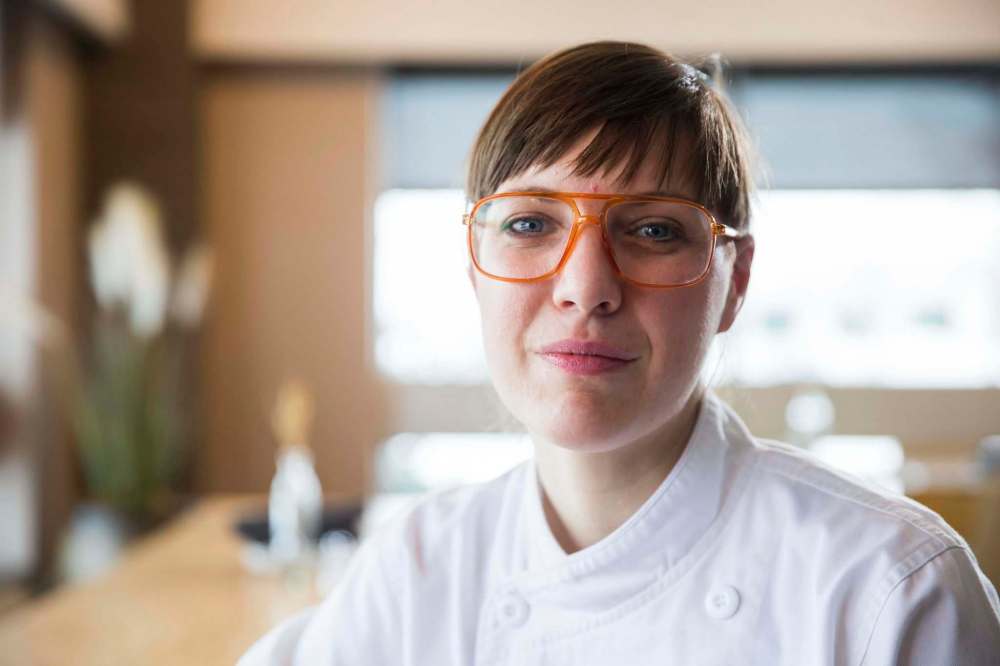Female chefs’ careers forged in fire Doc reveals cycle of abuse that women have difficulty ending
Read this article for free:
or
Already have an account? Log in here »
To continue reading, please subscribe:
Monthly Digital Subscription
$0 for the first 4 weeks*
- Enjoy unlimited reading on winnipegfreepress.com
- Read the E-Edition, our digital replica newspaper
- Access News Break, our award-winning app
- Play interactive puzzles
*No charge for 4 weeks then price increases to the regular rate of $19.00 plus GST every four weeks. Offer available to new and qualified returning subscribers only. Cancel any time.
Monthly Digital Subscription
$4.75/week*
- Enjoy unlimited reading on winnipegfreepress.com
- Read the E-Edition, our digital replica newspaper
- Access News Break, our award-winning app
- Play interactive puzzles
*Billed as $19 plus GST every four weeks. Cancel any time.
To continue reading, please subscribe:
Add Free Press access to your Brandon Sun subscription for only an additional
$1 for the first 4 weeks*
*Your next subscription payment will increase by $1.00 and you will be charged $16.99 plus GST for four weeks. After four weeks, your payment will increase to $23.99 plus GST every four weeks.
Read unlimited articles for free today:
or
Already have an account? Log in here »
Hey there, time traveller!
This article was published 14/12/2018 (2558 days ago), so information in it may no longer be current.
When Toronto documentarian Maya Gallus was filming The Heat, which gathers insights from seven female chefs about how restaurants are evolving as more women head up kitchens, the #MeToo movement had not yet exploded and the widespread takedown of abusive male chefs such as John Besh and Mario Batali had not yet begun.
Movie review
The Heat: A Kitchen (R)evolution
Directed by Maya Gallus
Cinematheque
Opens Saturday, to Dec. 23
75 minutes
Four out of five stars
One wonders if we would have heard more specific horror stories after the floodgates were loosed in late 2017; as it is, The Heat is an eye-opening and articulate look at the toxic culture and sexism that pervade the culinary world but it rarely touches on the specifics of sexual harassment that plague the industry.
Gallus — who also directed the doc Dish: Women, Waitressing and the Art of Service — brings together a diverse cast of female chefs, at different stages in their careers and with different goals, from grassroots pop-ups to haute cuisine.

Some of them overtly tout a kinder, gentler kitchen culture — Toronto’s Suzanne Barr strives to mentor women of colour at her neighbourhood restaurant — while others, such Victoria Blamey at the iconic New York tavern Chumley’s, seem resigned to being considered a bitch where a man in the same position would be called an artist.
Blamey and Amanda Cohen, of vegetarian restaurant Dirt Candy in New York, are baffled by the bias the media has against promoting female chefs (a montage of men on magazine covers further makes the point). Iron Chef winner Anita Lo, a second-generation Malaysian-American, points out the odds for success are even more stacked against non-gender-conforming women of colour.
All have experienced the “frat-boy hazing culture” of restaurant work and struggled to break what freelance Toronto chef Charlotte Langley calls “the cycle of abuse,” where even women, when they reach the top, treat their staff the way they were treated — badly — because that’s just how it’s done.
Writer and former line cook Ivy Knight eventually left the industry, but she recalls so wanting to be part of the team that she “turned into a little sh–head guy.”
An Insider’s Take
Winnipeg chef Kelly Cattani has worked in kitchens of every kind since graduating from Red River’s culinary program, from catering companies and fine dining restaurants to banquet halls and casual outlets. She agreed to give us an insider’s take on The Heat.
Winnipeg chef Kelly Cattani has worked in kitchens of every kind since graduating from Red River’s culinary program, from catering companies and fine dining restaurants to banquet halls and casual outlets. Until recently she was executive chef at Oak & Grain at the Hilton Winnipeg Airport Suites; she’s currently focused on opening her own restaurant in Charleswood, Bluestone Cottage (bluestonecottage.ca).
Cattani agreed to give us an insider’s take on The Heat.
Free Press: What was your general impression of the film?
Kelly Cattani: I thought it painted a really accurate picture of the kitchen culture, from a bunch of different perspectives, so I found it really interesting. I don’t usually watch cooking shows or culinary-based documentaries — I know there’s quite a few available on Netflix these days — they don’t resonate with me. But this was pretty raw, pretty rough and I thought it was pretty on-point.
FP: Some of the abuses were pretty shocking — including one instance of physical abuse recounted by Ivy Knight — and it seems unbelievable that can happen in a workplace and you just accept it.
KC: I don’t know if you accept it! You accept that it has happened to someone and it seems like a thing that could easily (happen). But I wouldn’t continue working there, personally, and I would have called a lawyer, but I appreciate that that wasn’t the thing she was able to do at that time.
FP: Did you relate to the women’s stories? Do you think sexism drives some people out?
KC: It’s a tough industry. I really liked the one quote by someone who said, “My chef wasn’t particularly singling out males or females; they were an equal-opportunity a–hole” — I thought, “One hundred per cent.” If that’s the kind of shop you come up in, if you can get through that and still like the job at the end of the day, good for you — keep going. But there are lots of reasons you might want to get out and I think part of that has to do with the culture and part of it has to do with the job itself. It’s going to be long hours, it’s going to be sweaty, it’s going to be poor pay.
FP: Some of the chefs in the doc don’t like the military aspect of the brigade de cuisine system by which kitchens are run; others say the strict discipline and defined roles are imperative. How do you feel about the brigade?
KC: I think it’s absolutely essential. The structure of a kitchen has worked for so long for a reason. It’s unfortunate, but quite often the people who are lower down on the scale of things don’t always understand why the people who are higher up are asking them to do what they’re asking them to do; they don’t have the whole picture. Many industries are like that, but for us it’s more minute to minute. If I need you to brunoise this carrot now, you don’t need to talk about why.
FP: Which of the seven chefs did you relate to the most?
KC: I really resonated a lot with the way Victoria Blamey (of Chumley’s in New York) seemed to run her kitchen and how she seemed to interact with her staff and some of the concerns that she raised were very similar to my view on women chefs. She seemed to be very competent and very accomplished and she’s clearly followed the path that you’re supposed in terms of going up through that brigade system and then getting to the top notch and then finding out when you get there, she’s maybe doing great work but the media’s not talking about it as much as they would with a boy. The opportunities that you’d expect to come out maybe weren’t being presented in the same way that someone who was a male in her position might receive them.
FP: The film did a good job of providing a really broad representation of chefs, with different experience and styles.
KC: I thought so as well, but at the same time, it almost came across as “These are the only ones we could find.” I wanted that montage at the end that showed all of the women working in kitchens. It’s not that women aren’t running kitchens, it’s that they aren’t in the media, they’re not shown to be running kitchens… I think about our industry here in Winnipeg and I don’t think there’s much disparity between males and females but we do have a lack of media representation.
Cattani is one of the chefs participating in the 2019 Women, Wine and Food event in support of Women’s Health Clinic, which features culinary samples created by local female chefs and paired with wine or beer tastings. Tickets for the fundraiser — which takes place on International Women’s Day, March 5 — are on sale for $100-$125 at wfp.to/womenwine.
But there are strides being made toward a more nurturing environment, or at least one that isn’t rage-fuelled and abusive. Angela Hartnett of London’s Murano restaurant and Merchant Tavern famously survived Gordon Ramsay’s insults and vein-popping rants: she runs her kitchens with a firm but understated authority.
Gallus doesn’t lean toward any one explanation as to why women in the kitchen are overlooked by the media or the culinary star system; the chefs themselves offer their own interpretations. “Men cook for glory and women cook for love,” says Lo, though it’s not clear if she fully believes that herself.
The doc makes the point that female chefs more often operate casual mom-and-pop restaurants — which are less likely to attract awards and media attention — because it’s harder for them to secure financing for the pricer startup costs of an upscale place.
Lo closes the doors of Annisa, her lauded Greenwich Village restaurant, by choice, ready to move on to a new chapter; Barr, however, is forced to shutter her casual eatery Saturday Dinette over a dispute with the landlord. (The lunch counter she and her husband planned to open down the street — documented in the film — has been indefinitely postponed.)

Anne-Sophie Pic didn’t have that concern: world-renowned restaurant-hotel Maison Pic has been in her family for three generations; she is one of a mere handful of female chefs to attain three Michelin stars. The atmosphere behind the scenes at her restaurant in France is as far away from Hell’s Kitchen as a Big Mac is from a chateaubriand. In a hushed, well-lit, immaculate space, Pic rules with a gentle hand — no raised voices, no insults.
However, she admits it wasn’t always thus: without formal training, she took over the restaurant from her brother and late father, battling insubordination and disrespect from staff members who saw her as an interloper and a pretender to the throne.
Whether you’re someone who works in the food industry or someone who just likes to eat out, The Heat is a dishy but thoughtful doc that offers plenty of food for thought.
Director Maya Gallus will be at Saturday’s 7 p.m. screening to introduce the film.
jill.wilson@freepress.mb.ca
Twitter: @dedaumier


Jill Wilson writes about culture and the culinary arts for the Arts & Life section.
Our newsroom depends on a growing audience of readers to power our journalism. If you are not a paid reader, please consider becoming a subscriber.
Our newsroom depends on its audience of readers to power our journalism. Thank you for your support.
History
Updated on Friday, December 14, 2018 10:50 PM CST: Fixes typo









